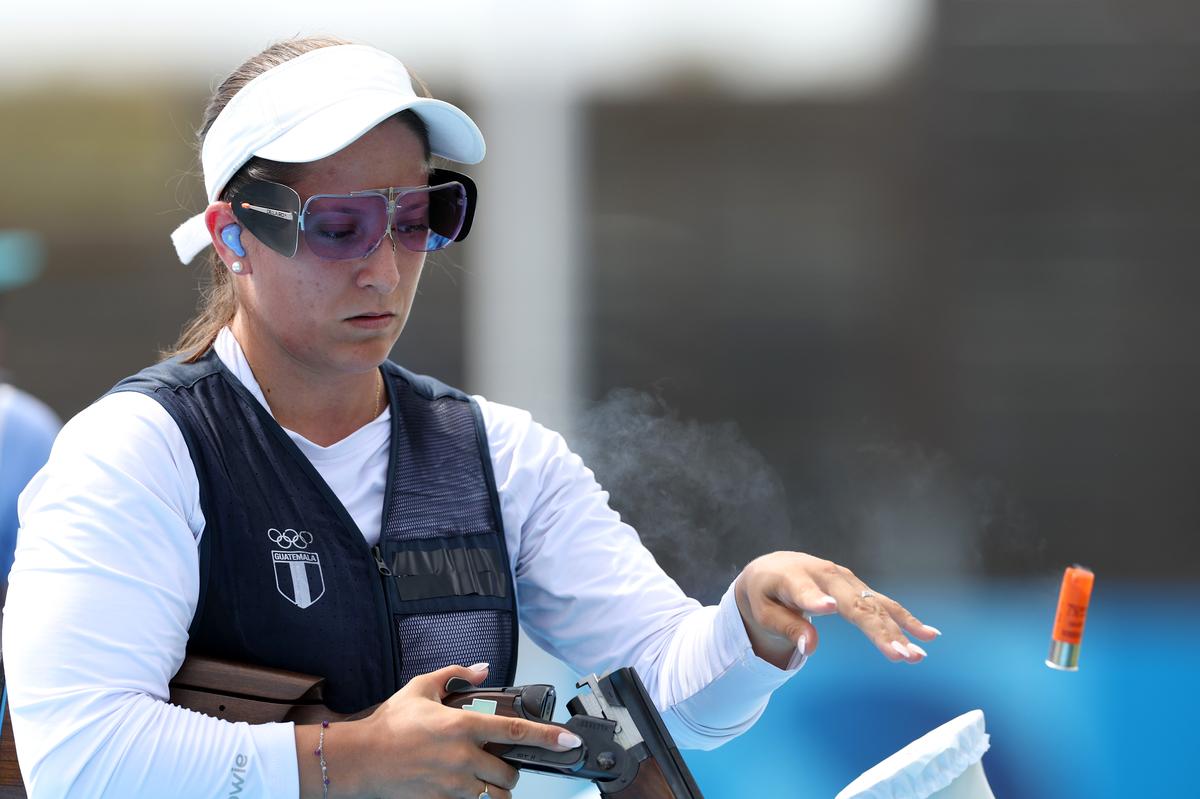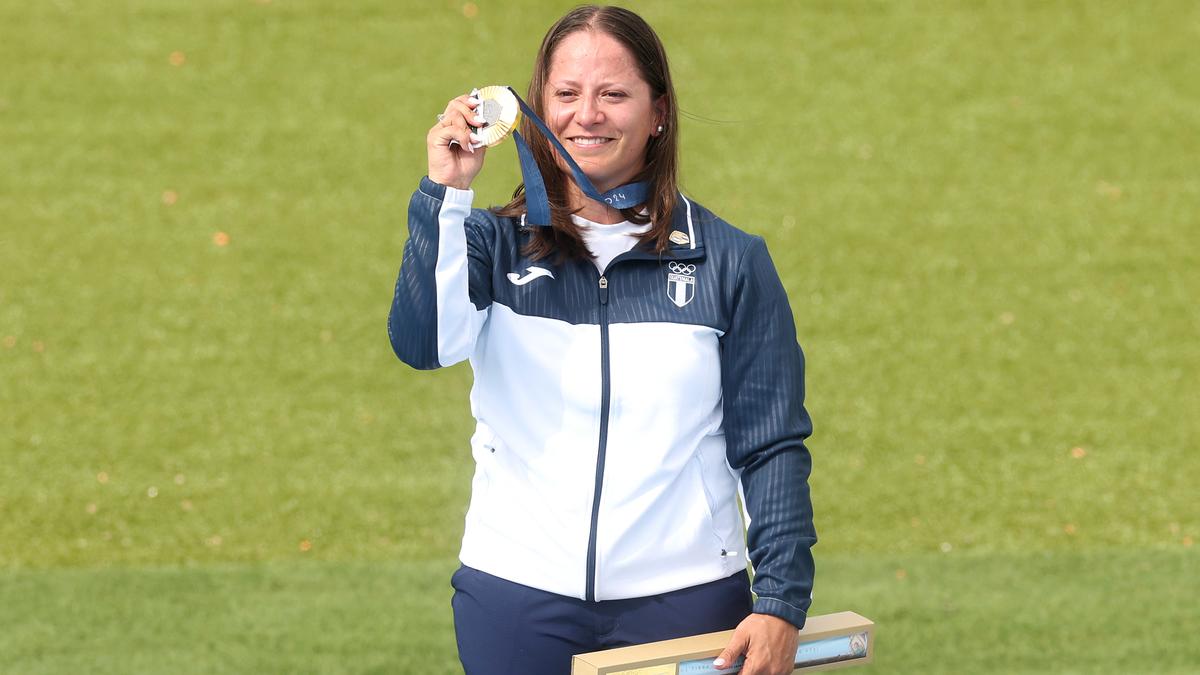Once deprived of pursuing gymnastics, Olympic champion Adriana Ruano has learnt shooting for stars well
Adriana Ruano Oliva didn’t have the best debut at the ISSF World Cup Final in New Delhi, finishing 10th out of 11 participants in the women’s trap with a score of 108/125. However, her disappointment at the World Cup final will likely be only a footnote in what has been a career-defining season.
Just two months ago, at the Olympic shooting competition in Chateauroux, the 29-year-old achieved a personal best of 122 in qualifying, followed by an Olympic record of 45 in the final to win the women’s trap event. Her gold medal was the first ever won by the Central American nation of Guatemala.
Adriana can still hardly believe what she has accomplished. “It’s been almost two months since winning the Olympic title, but I’m still happy. You know, this has had a big impact on my life, like reaching my dream of almost 25 years,” she tells Sportstar.
While an Olympic medal had been her dream ever since she was four years old, she never thought she would achieve it as a shooter.
“I think it was just destiny that I even got into the sport. I had nothing to do with shooting, and no one in my family was a shooter either. I actually wanted to compete in the Olympics as a gymnast,” she says.
Shooting as a sport was almost unknown in Guatemala until recently. Adriana only found her way to the sport after the heartbreak of knowing she could no longer compete in her first love, gymnastics.
“Gymnastics isn’t as popular as football, of course, but it’s definitely more popular than shooting,” she laughs. Starting out at just four years old, Adriana became one of her country’s top prospects. “We weren’t at the level of the USA, but we had our dreams too. Mine was to compete at the Olympics. I was one of five girls who were expected to work towards qualifying for the London 2012 Games,” she recalls.
Adriana competed in multiple international events for her country, including the 2010 Pan American Championships in a field that included Gabby Douglas and McKayla Maroney, and subsequently in the qualification competition for the 2011 Pan American Games.
However, just as she hoped to build towards qualification for the London Games (2012), she received the news every athlete dreads. “I was told I had permanently injured my spine. I had done so much jumping and suffered so much impact damage on my joints. At that time, my coaches didn’t have us do a lot of physical therapy. My muscles were always tense. I wasn’t getting enough blood going to my spine, and eventually, I just couldn’t compete anymore,” she says.

Adriana had always dreamed of competing at the Olympics but thought she would do so as a gymnast. Now she had another path to follow.
| Photo Credit:
Getty Images
Adriana had always dreamed of competing at the Olympics but thought she would do so as a gymnast. Now she had another path to follow.
| Photo Credit:
Getty Images
After a year of therapy with no improvement, the verdict came. “In the end, my doctor said I was never going to be able to train or compete as a gymnast again. I was four years old when I started gymnastics, and at 17, I was told I could no longer do it,” she recalls.
As she processed her disappointment, her doctor suggested trying another sport. Her brother’s friend, a shotgun shooter, recommended she give it a go. It wasn’t something that came naturally to her.
“I didn’t like it at first, but with time, I started loving and becoming passionate about the sport. It took me some time to adjust. I had been a gymnast all my life, and shooting is the complete opposite. In gymnastics, you need to make very explosive movements, whereas, as a shooter, you have to make very small and precise movements. Gymnastics is practiced indoors, while shooting, of course, takes place outdoors,” she says.
An unexpected opportunity
Adriana never imagined shooting as a career at the start. “I saw it as a sort of mental therapy. I was so devastated by the knowledge that I would never be able to compete as a gymnast again, so I wanted to do something completely different. Shooting was just a distraction for me,” she says.
However, she soon started competing in domestic competitions and, to her surprise, began winning. “I was still relatively new to the sport, but I found out that I really enjoyed the competitive part of it,” she says.
In 2014, three years after she bid goodbye to her gymnastics career, and just a year after she first picked up a shotgun, Adriana took part in her first international competition — the Continental Championships in Guadalajara. She had a disastrous debut, scoring just 52/125, but it only whetted her appetite to compete more.
At that time, her goals were modest — to make the national team and compete in the odd World Cup. The real impetus to take the sport seriously, though, came from an event she wasn’t even participating in.
“The thought that I could perhaps compete in the Olympics in shooting came to me in 2016 when I went as a volunteer to the Rio Olympic Games. I had been practising shotgun shooting for nearly three years by then, so I got the chance to volunteer at the shooting range in Rio. I was wearing a yellow jersey like every other volunteer, but I was able to watch all the competitions and even managed to take a photo with the Olympic champion of that time. Perhaps the best thing that happened was seeing two of my teammates, Enrique Brol and Hebert Brol, compete in Rio. That was a big motivation for me. I thought, ‘okay, this is what I want to do,’ and I started taking my shooting very seriously when I returned to Guatemala,” she says.
Adriana had always dreamed of competing at the Olympics but thought she would do so as a gymnast. Now she had another path to follow.
She fulfilled part of that dream when she qualified for the 2020 Tokyo Olympics by taking silver at the 2018 Pan American Championships, scoring 111/125 in the same range in Guadalajara, where she had made just 52/125 four years earlier. Though she only finished 26th in Tokyo, Adriana continued to improve as a shooter. She qualified for the Paris Games with gold at the 2023 Pan American Games, then set a personal best of 118/125 at the Doha Olympic shotgun qualifiers in 2024 before delivering the best performance of her career in Chateauroux.
Balancing careers
While Adriana had the desire and talent, other challenges remained. Shooting, a relatively minor sport, receives little funding in Guatemala. There is only one shotgun range in the country, located in the capital, Guatemala City. “Funding has always been hard. My family supported me, and before the Olympics, the National Olympic Committee helped with ammunition. But even with that, we can’t shoot nearly as much as shooters from other countries. We also can’t travel to as many competitions as others,” she says.
Even equipment couldn’t be taken for granted. “I actually started my career with a shotgun that belonged to the National Federation. It was only after I qualified for the Tokyo Olympics that I finally bought my own gun,” she says.
Even now, after winning an Olympic gold medal, Adriana still balances her days between practising on the range and working as a dietician. “I’m not a full-time shooter. I have a clinic in Guatemala where I provide consultancy as a sports dietician. I want to specialise in working with sportspeople, but I mostly work with regular clients who want to gain or lose weight,” she says.
While she doesn’t expect shooting to suddenly become the most popular sport in Guatemala, Adriana is optimistic that things are heading in the right direction post-Olympics.
“It’s a huge deal that Guatemala won not just one but two Olympic medals (Jean Pierre Brol won bronze in the men’s trap). These were only the second and third Olympic medals for Guatemala. Suddenly, there’s a lot more interest in shooting. Many people are calling the Guatemalan Federation, asking how they can start practising this sport. Our performances created a lot of awareness. Even the government is helping — they’ve started building a new shotgun range. The one we have now is very old, and much of the equipment doesn’t work, so a new range will be really helpful,” she says.
Her life has changed too. “There’s been so much media attention. I think it’s impossible to go back to how life was before the Olympics. Now, there’s a lot more responsibility. Guatemala doesn’t have many Olympic medallists, so I have to be the best example of one. I have to be the best example of a good person and athlete,” she says.
She’s not complaining. “When I started shooting, I never imagined I’d be where I am today. I was so disappointed, thinking my gymnastics career was over. But I think it shows that even when we believe we’re in a bad place, opportunities are always in front of us. We just need to look for them,” she says.



